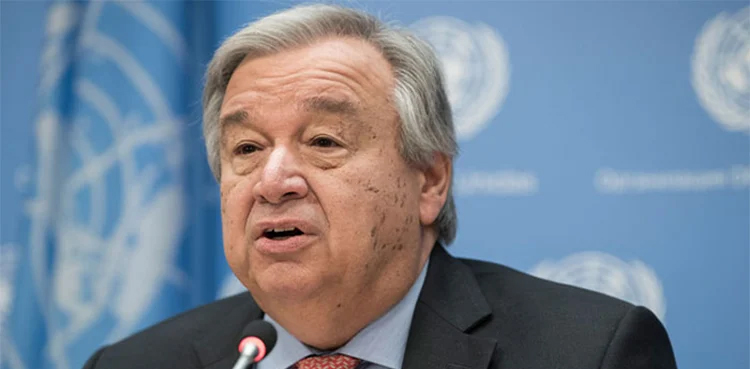
NEW YORK: After disastrous torrential rains and floods, the United Nations (UN) Secretary-General Antonio Guterres announced to visit Pakistan on September 9.
The UN chief’s spokesperson Stephane Dujarric said in a statement that Antonio Guterres will pay a solidarity visit to flood-hit Pakistan on September 9.
Dujarric said, “With the tragic situation facing millions of men, women and children impacted by historic floods in Pakistan, the Secretary-General will travel to the country next week for a solidarity visit.”
Guterres is expected to arrive in Islamabad on Friday from where he will be accompanied by Pakistani officials for visiting the flood-affected areas and reviewing the relief activities.
READ: US ANNOUNCES $30MN AID FOR FLOOD-RAVAGED PAKISTAN
The UN chief will also reviewed the status of the humanitarian assistance provided by the global institutions.
Earlier, the United Nations (UN) issued a flash appeal for $160 million to help Pakistan cope with catastrophic floods that have killed more than 1,100 people and affected 33 million people.
“Pakistan is awash in suffering,” UN Secretary-General Antonio Guterres said in a video message for the launch of the appeal in Islamabad and Geneva.
He further said: “The Pakistani people are facing a monsoon on steroids – the relentless impact of epochal levels of rain and flooding.”
READ: FLOODS IN PAKISTAN: CHINA ANNOUNCES 100M YUAN AID
Antonio Guterres said the scale of needs, with millions of people forced from their homes, schools and health facilities destroyed and livelihoods shattered by the climate catastrophe, required the world’s collective and prioritised attention.
Guterres said the $160 million he hoped to raise with the appeal would provide 5.2 million people with food, water, sanitation, emergency education and health support.
He appealed for a speedy response to Pakistan’s request to the international community for help. “Let us all step up in solidarity and support the people of Pakistan in their hour of need,” he said.
Pakistan estimates the floods have affected more than 33 million people, or more than 15% of its 220 million population.

No comments: